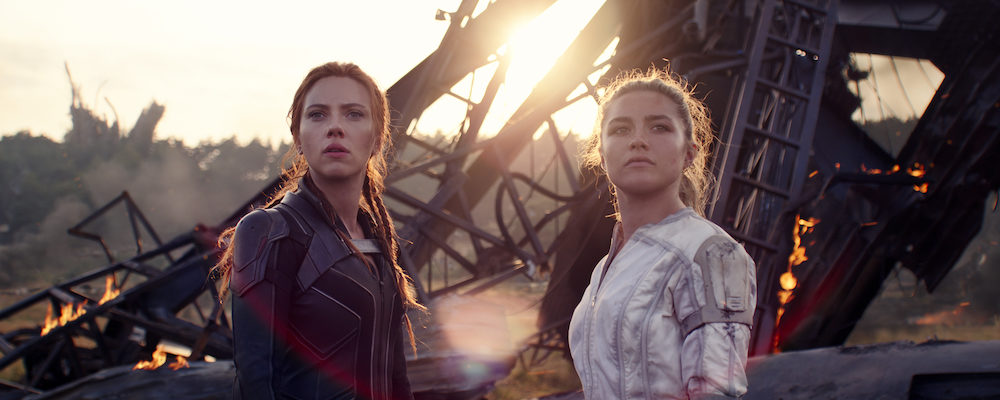‘Black Widow’: Scarlett Johansson Exits MCU With Classic Espionage Suspense
Alci Rengifo
“Black Widow” stands apart from the rest of the Marvel Cinematic Universe in various ways. It gives a great female character a stronger treatment than in previous titles, while at the same time guiding her to the exit. On a level of pure entertainment it’s a strong spy thriller, shot on a slightly smaller scale than your average MCU opus. It still maintains a larger scale when compared to a typical action thriller, but the real focus is on the character of Natasha Romanoff aka Black Widow, played by Scarlett Johansson. The film never overreaches in trying to add layers to the character, but it does combine darkness and humor to make her engaging as a classic espionage persona. Like all classic spies, she’s eternally haunted by the past.
The setting is after the events of “Captain America: Civil War.” The Avengers have broken apart and Natasha is on the run. While evading SWAT teams, she makes contact with her long-lost sibling, Yelena (Florence Pugh), who is also a highly trained assassin. Flashbacks reveal how Natasha and Yelena lived as young girls with Soviet spy parents in Ohio, Alexei (David Harbour) and Melina (Rachel Weisz). The family was separated once their cover was blown and Natasha and Yelena were trained as “Black Widow” assassins, while Alexei went off to be the USSR’s answer to Captain America, the Red Guardian. Natasha would also vanish after killing Dreykov (Ray Winstone), who ran the Black Widow program and the infamous “Red Room,” and his own young daughter. But now Yelena has broken free from her mind-programming, with a chemical that apparently awakens Black Widows from their brainwashed state. Not only that, but an old foe is still alive. Now Natasha and Yelena must reunite with Alexei and Melina and save the world, etc.
“Black Widow” arrives at a transitional moment culturally and for the MCU. It’s almost bittersweet considering it took this long for the character to get her own movie and it drops just as Johansson leaves the whole Marvel game. You may recall Black Widow met her end during the last two “Avengers” behemoths. So what we get here is almost a mini-tribute to the character. It’s a sequel/prequel, set after the events of “Civil War” and right before “Infinity War.” There is also no attempt to objectify a female hero this time around. Black Widow is not a sexualized image, but a dangerous human weapon. Directing this time around is Cate Shortland, who made the haunting, dreamlike “Lore,” about a German girl wandering through a scorched homeland during the last days of World War II. She also directed episodes of “SMILF.” It’s no surprise Shortland doesn’t stray too much from the established MCU aesthetic or look, but what she does do is turn “Black Widow” into a strong character piece. What was mostly hinted at in the previous films becomes more defined here. Natasha and Yelena are two siblings trying to make amends with the past. Natasha feels the sting of having killed Dreykov’s daughter, and when there’s evidence he might still be alive, it’s a chance to snuff out the evil that set the course of her life. Yelena in turn wants to get closer to her sister, even if she also pretends to have a hard exterior.
The screenplay by Eric Pearson combines multiple genres with recognizable MCU humor. “Black Widow” has action scenes involving car crashes, daring helicopter rescues in frozen Russian landscapes, and stand-offs with villains in maniacal laboratories. The opening titles have the energy of a “Mission: Impossible” movie, with rushing news footage of recent uprisings in Ukraine and other corners of the globe. But the heart of it is a darkly funny family story. Natasha and Yelena break Alexei out of prison, and he becomes one of the more colorful recent Marvel side characters. He’s shaggy, with “Karl Marx” tattooed across his knuckles. He’s nowhere near an intellectual. Instead he is more of a macho teddy bear who won’t shut up about his glory days as the Red Guardian. You better expect him to put on his old costume, even if the zipper takes longer to close. A funny in-joke is that Alexei keeps asking Natasha if Captain America ever mentioned him. David Harbour and Racheil Weisz have mischievous chemistry as a spy couple whose marriage was false but not the sex appeal. Yet all four sit down for dinner, even if Natasha harbors the bitterness of abandonment. It’s like a twisted version of “The Americans.” Like that show, the jokes and superhero material are really about how families are rarely perfect, and need to work through lingering resentments. Shortland’s take on family is at least more convincing than anything in “F9.”
For most of the third act “Black Widow” jumps into the full action mode of a standard spy thriller. Eventually everyone has to break into a secret facility and face-off with the mad villain and his acolytes, one of whom wears an unnerving metal suit. There are well-designed, massive explosions and crashing structures, and more Black Widows who need to be liberated. Ray Winstone is so good in these moments he should be cast in the next Bond reboot. It is not a spoiler to reveal Black Widow makes it out alive, because fans know her real, wrenching exit is approaching in the events of “Avengers: Endgame.” For Scarlett Johansson it’s a worthy send-off from this series, because she ends the character on a stronger note than when she made her first appearance in “Iron Man 2.” Her final moment in this movie has some pop poetry in how it avoids being overdone. She walks away from us, in one of those classic wide shots, towards destiny.
“Black Widow” releases July 9 in theaters nationwide and Disney+ Premier Access.

